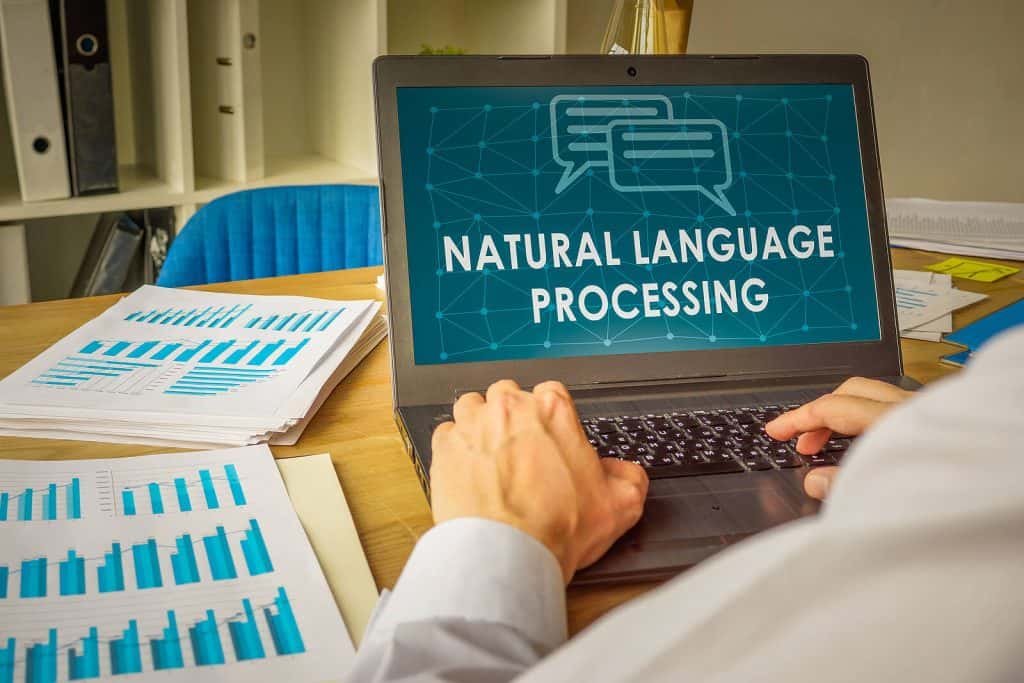Why are Natural Language Processing courses in high demand? Where can you find NLP training?
Table of Contents
ToggleNatural Language Processing or NLP is a sub-genre of Artificial Intelligence (AI), which uses advanced computer applications and Machine Learning (ML) techniques to enable systems to analyze, comprehend, and generate spoken or written words in natural human languages.
Multiple data sources such as audio streams and text provide unstructured information in many languages, enabling NLP algorithms to interpret this data and perform numerous functions. These include spelling and grammar checking in word processing or similar applications, sentiment analysis of social media commentary and customer feedback, summarizing blocks of text, and translation.
Natural Language Processing technology is the basis behind digital voice assistants, chatbots, autocorrect mechanisms, targeted advertising, machine translation, and other commercially valuable applications. Enterprises seeking solutions to specific business issues also turn to NLP scientists for help. As a result, Natural Language Processing skills and knowledge are currently in high demand.
So it should come as no surprise that there are resources, knowledge bases, and natural language processing course offerings available in several formats, such as formalized training, downloads or streaming media, papers, and digital documentation. We’ll be looking at some of these natural language processing courses and training resources.
Institutional Training Courses in NLP
Many formal institutions of education run regular natural language processing courses.
At an introductory level, Stanford University offers a course titled “From Languages to Information” that covers the basic principles of information retrieval, text processing, chatbots, sentiment analysis, and other key topics central to NLP. Suitable for those with little or no programming experience, the course also includes an introductory Python tutorial.
Stanford offers “Natural Language Processing with Deep Learning” for more advanced computing students, a course with a largely mathematical focus for those with a deeper understanding of machine learning, statistics, and basic calculus. Since many ideas relating to NLP are based on matrix calculus, neural networks, and vectors, these concepts make up a large part of the training.
“Applied Natural Language Processing” at UC Berkeley is a comprehensive course for graduates with topics that include the use of text for problem-solving in classification and regression analysis, the modeling and representation of various text elements such as syntax, named entities, and parts of speech, and the extraction of information from entities mentioned in a body of text.
With COVID-19 restrictions having forced the closure of many campuses, many of these institutional courses give access to at least some of their training to students online.
NLP Online Courses
Outside of formal institutions, the internet provides access to a selection of training programs in NLP. One of the best online courses for natural language processing that caters to beginners is “Explore Natural Language Processing” from Microsoft. This uses the Azure cloud computing platform as a medium for teaching the fundamentals of NLP. Azure also provides resources for developing NLP applications, such as text analytics and translation services.
Another cloud provider, Amazon, offers the online course Natural Language Processing as part of its Machine Learning University program. As well as imparting practical knowledge in NLP applications and model training, the course helps participants gain a deeper understanding of Machine Learning, model evaluation, and data preprocessing. It’s available via GitHub, with tutorials on Amazon’s Machine Learning University (MLU) YouTube page.
A lot of online NLP courses use the Coursera electronic learning or eLearning platform. The basic Coursera Natural Language Processing course covers the subject areas as diverse as dialogue state tracking, sentiment analysis, and text summarization.
Taking a more specialized focus, Coursera’s “Natural Language Processing Certification in TensorFlow” instructs learners in using TensorFlow to assemble NLP frameworks. The course is part of the Coursera deep learning specialization program. It features subjects like representing sentences as vectors with the ultimate aim of using them as inputs to neural systems.
Online NLP Certification
In the current market, Natural Language Processing is an area of core competence in IT and the data sciences, as many industries look to digital applications that can harness the potential of human languages. The resulting surge in demand for NLP experts has created a matching need for formalized NLP certifications as proof of the skill-sets of job candidates.
There are several avenues for obtaining a natural language processing certificate online. For example, Google Developers Certification is a level one certificate course that centers around managing and working with Machine Learning techniques in real-world scenarios. Students are expected to have a working knowledge of Natural Language Processing, real-world image data, and Convolutional Neural Networks. Successful candidates become eligible to join TensorFlow’s Certificate Network and display their certificate and badges on GitHub, their resume, and their social media handles.
“PG Certification in Machine Learning and NLP ” is a six-month course that upgrade offers for working professionals looking to earn a PG certificate from IIIT-Bangalore. With mentoring and chances to interact with industry experts from Gramener, Actify, and Flipkart, the course covers five modules — Natural Language Processing, Machine Learning I and II, Statistics and Exploratory Data Analytics, and a Data Science Tool Kit. At the end of the program, upGrad offers all candidates assistance in job placement.
Columbia University’s professional certification in “Data Scientists for Executives” aims to teach C-suite and other business executives the fundamentals of analyzing vast amounts of data using techniques that include Natural Language Processing and a range of technologies, including the Internet of Things or IoT.
Other Web and Social Media Resources
Beyond these more formalized settings, the web has plenty to offer regarding NLP tutoring and resources. For example, the portal TutorialsPoint.com offers a dedicated natural language processing tutorial geared toward graduates, postgraduates, and research students looking to expand their knowledge of NLP. The material exists as online documentation. Though readers can range from beginner to advanced level, they are expected to have some familiarity with the basics of Artificial Intelligence and the concepts of programming in Python.
YouTube plays host to a number of NLP tutorials in streaming format, such as the Amazon Machine Learning University content that we’ve already mentioned.
Elsewhere, the Stanford NLP group website provides links to tools, publications, and resources relating to natural language processing. And on Twitter, the hashtag #nlproc provides a gateway to articles on NLP, while lists like NLPers offer a selection of NLP and related accounts.
NLP Books and Documents
Natural language processing books and written documents on NLP tend to take either a theoretical or practical approach.
“Neural Network Methods in Natural Language Processing” by Yoav Goldberg and Graeme Hirst (Published on April 17, 2017) is one of the most comprehensive books on Natural Language Processing theory. Its focus is on the concepts behind neural networking models for NLP and their use in solving problems in this area.
On the practical side, “ Practical Natural Language Processing: A Comprehensive Guide to Building Real-World NLP Systems” by Sowmya Vajjala, Bodhisattwa Majumder, Anuj Gupta, and Harshit Surana (Published on June 17, 2020) provides guidelines on building your own NLP system to tackle real-world problems.
NLP Formal Education
Educational establishments have successfully employed NLP to help identify student grammar and word mechanics problems and provide holistic scores for five-paragraph essays. And there are other ways to use natural language processing for enhancing teaching and learning.
For example, actionable feedback on specific portions of a student essay can help develop writing skills and as a primer during exam revision. Modern NLP solutions can also be integrated into automatic writing evaluation (AWE) systems to give low-level feedback such as vocabulary tips or higher level critique such as advice on the structure and cohesion of written passages.
By analyzing the use of language in the classroom, educators can gain a greater sense of students’ mental state and attitudes during learning. This branch of NLP research is still in its early stages. Still, developments in this area could have implications for rapid response to the results of student sentiment analysis, enabling course corrections and improvements to lesson planning and the curriculum.





